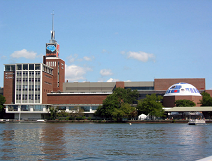
Creating a Software Ecosystem for Data Intensive Science
"Data Intensive Science" is an acknowledgement that as simulations and experiments continue to generate larger amounts of data, we must turn our attention on how to move, store, manage, analyze and visualize this data in a timely fashion. The cost of "write once read never" is becoming too expensive and we must start to create software eco-systems to help us cope with this flood of data from scientific instruments and calculations. "Big Data" can be characterized by the as five Vs of data intensive science: volume, velocity, variety, veracity, and value. Understanding how applications and experiments will change in the next ten years is critical in order to develop a software eco-system that can handle the implications of "Big Data" in order to allow for knowledge discovery. In this talk, we will explore different software systems used by scientists today, and the extension of many of these software artifacts to bring them together into a complete software ecosystem that can be amenable to next-generation science. In particular we will focus on the ADIOS software system as a framework for the management of large data, and the use of operations on the data using the next-generation VTK-M visualization software system, and explore its usage in both the short and long term.
Bio:
Scott A. Klasky is a distinguished scientist and the group leader for Scientific Data in the Computer Science and Mathematics Division at the Oak Ridge National Laboratory. He holds an appointment at the University of Tennessee, Georgia Tech University, and North Carolina State University. He obtained his Ph.D. in Physics from the University of Texas at Austin (1994), and has previously worked at the University of Texas at Austin, Syracuse University, and the Princeton Plasma Physics Laboratory. Dr. Klasky is a world expert in scientific computing and scientific data management, co-authoring over 190 papers. He is also the team leader of the Adaptable I/O System (ADIOS) project, which won an R&D 100 Award in 2013.



